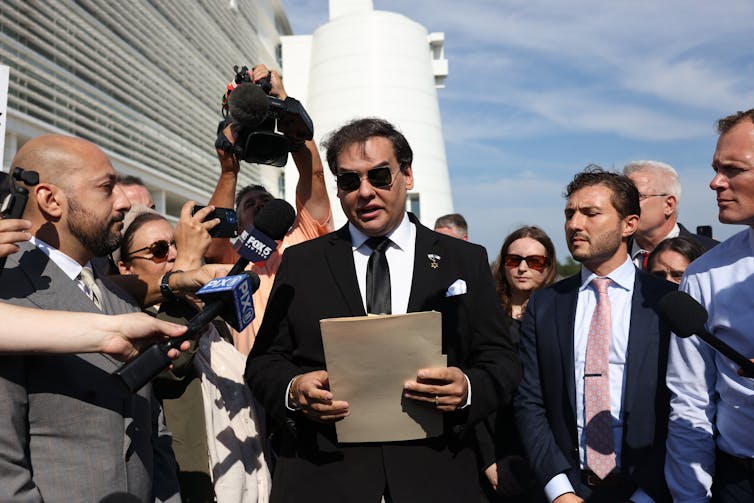Eric Adams indictment: How campaign finance violations often grow into dramatic scandals
Federal investigations into irregular election spending can uncover wild stories. Politicians have used campaign money to pay rent, fund family vacations, book hotel rooms for mistresses − and worse.
New York City Mayor Eric Adams has been charged with bribery and fraud following a spiraling federal investigation into his administration.
Among other accusations, federal prosecutors alleged in their September 2024 indictment that Adams received campaign donations from the Turkish government for his 2021 mayoral race and sought to conceal these illegal foreign contributions.
Adams is New York’s first mayor to be charged with a crime, but he is hardly the only politician to run afoul of rules that govern how political campaigns can raise and spend funds in U.S. elections.
And as we document in our new podcast, “Scandalized,” discovering campaign finance violations is often just the first chapter in a much wilder story.
Why campaign finance law matters
The U.S. has federal rules that govern how political campaigns can raise and spend money in U.S. elections. For example, they limit how much money individuals and groups can contribute to candidates’ campaigns. Federal rules also restrict how campaign funds may be used and require the disclosure of all campaign expenditures, ensuring candidates can’t spend campaign money on whatever they want.
Legally, candidates may use campaign donations on expenses directly related to their race for office. Allowable expenditures include advertising, travel and costs related to fundraising, such as renting an event space or buying food for guests. Candidates may use excess campaign funds after the election is over to pay down outstanding loans, or they can transfer it to other campaigns or party organizations.
Campaign funds may not, however, be spent at any time on purely personal expenses. Candidates cannot pay their mortgage or rent out of their election war chest, or purchase clothing or household supplies.
The disgraced former U.S. Rep. George Santos, a Republican from New York, was a particularly egregious violator of the rules related to personal expenses.
Santos pleaded guilty in August 2024 to nearly two dozen counts of campaign finance violations – a smorgasbord of crimes. According to The New York Times, he rerouted “tens of thousands of dollars of campaign money toward personal expenses, including luxury goods, Atlantic City casinos, rent payments and a website primarily known for explicit sexual content.”
Santos, who served for just under a year until he was expelled from Congress in December 2023, is a prime example of how the complicated U.S. campaign finance system can unearth other, even more scandalous actions by politicians.

A window into bigger scandals
A key element of campaign finance law is disclosure. Candidates must publicly report donations over US$200, for example, and document everything they spend those donations on during and after their campaigns.
For former U.S. Rep. Duncan Hunter Jr., a California Republican, failure to comply with disclosure laws during his 2016 election campaign resulted in a federal investigation. The Justice Department found that Hunter used campaign donations to fund family vacations, video game purchases and hotel rooms for multiple extramarital affairs. In 2020, he was sentenced to 11 months in prison.
Former President Donald Trump’s longtime lawyer and fixer, Michael Cohen, also failed to disclose a contribution to his boss’s 2016 presidential campaign. But the real scandal was what that money actually went for: paying adult film actress Stormy Daniels for her silence about an alleged affair with Trump in 2006. Cohen pleaded guilty in 2018 to making an unlawful contribution.
Many, if not most, campaign finance violations are minor. Small mistakes such as filing a late donor disclosure report or miscategorizing an expense usually incur little more than a small fine.
When technical campaign finance violations shed light on a big scandal, however, they attract attention. Voters and the media latch onto the fact that not only are donors’ funds not going where they intended, but in many cases the money has been spent to subsidize candidates’ personal misbehavior and corrupt activity.
High-profile political scandals erode the public trust
Just about every recent survey shows Americans’ levels of faith and trust in government at historic lows. In the 1960s, three-quarters of voters said they trusted the government to do the right thing most or all of the time. Today, only one-fifth do.
Unseemly behavior by politicians, including by candidates who misspend their supporters’ donations, may contribute to this declining trust. Americans have real fears about money in politics. For example, 84% of Americans worry that wealthy lobbyists and interest groups have undue influence on elections, and 80% say campaign donations have corrupting effects on politicians.
Even when candidates aren’t technically breaking the law, they often use campaign funds in ways donors may not realize – or appreciate.

In the 2024 election, for example, political campaigns, both major parties and private fundraising entities on both sides of the aisle have spent millions in campaign funds on the legal fees of candidates fighting court battles over allegations of serious criminal misconduct.
Beneficiaries include Trump, who has been indicted for suspected mishandling of classified documents, and New Jersey’s Democratic U.S. Sen. Robert Mendendez, who was recently convicted on federal corruption charges.
The bottom line: Donations made to help a candidate win their race are not always going where donors actually intended or believed they would.
Still, the U.S. political climate is so polarized that these scandals may not dramatically affect voters’ decision-making. Political scientists sometimes refer to today’s voters as “calcified” in their partisan identities, meaning they are so loyal to their own party that campaign-finance violations and other scandals cannot change their views much.
Research shows voters are also increasingly motivated not so much by their support or affection for their own party but rather by their fear and loathing of the other party. As a result, partisan voters are willing to accept or forgive scandalous behavior from their own side in the interest of beating the opposition. Hardcore partisans are also adept at finding ways to justify or rationalize these transgressions.
With record amounts of money flowing in and out of political campaigns in 2024, the coming months are bound to bring more campaign finance scandals. But our research indicates they are unlikely to have major effects at the polling station.
The authors do not work for, consult, own shares in or receive funding from any company or organization that would benefit from this article, and have disclosed no relevant affiliations beyond their academic appointment.
Read These Next
Detroit was once home to 18 Black-led hospitals – here’s how to understand their rise and fall
In the early 20th century, Detroit’s Black medical professionals created a network of health care…
From moral authority to risk management: How university presidents stopped speaking their minds
Nearly 150 universities and colleges have adopted institutional neutrality pledges since 2023.
Taboo tics like shouting curses and slurs are uncommon in Tourette syndrome − but people who have th
Obscene language tics, called coprolalia, don’t reveal what people with Tourette’s think and feel.…






